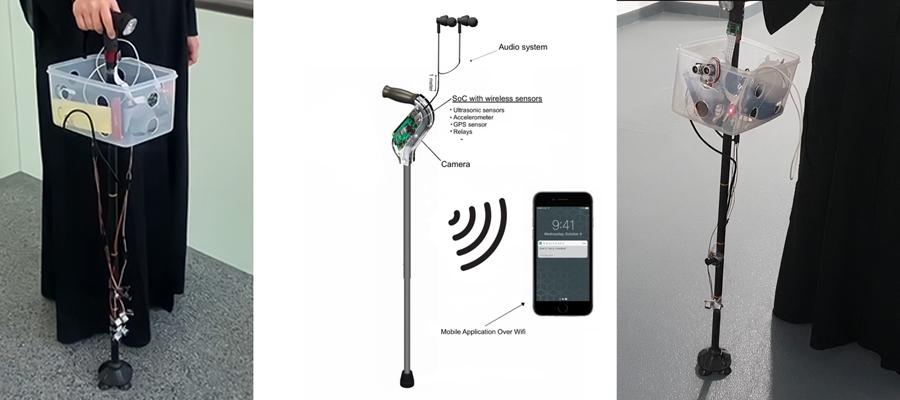- About
- Admissions
- Study at AUS
- Prospective Students
- Bachelor's Degrees
- Master's Degrees
- Doctoral Degrees
- Admission Publications
- International Students
- Contact Admissions
- Grants and Scholarships
- Sponsorship Liaison Services
- Testing Center
- New Undergraduate Student Guide
- Undergraduate Orientation
- New Graduate Student Guide
- Graduate Orientation
- File Completion
- Payment Guide
- Students with Disabilities
- Executive and Continuing Education
- Academics
- Life at AUS
- Research
- Publications
- Contact Us
- Apply Now
- .

AUS students design an IoT-based smart cane for people with visual impairment
A team of students from American University of Sharjah has designed an innovative smart cane to assist people with impaired vision as part of their graduation design project.
The design project features two parts: a smart phone application with a voice-alert feature that allows Google Maps to locate the user, and an adjustable cane that is connected to a wheeled chassis. The main computing processing component, sensors and cameras are attached to the cane. Using Internet of things (IoT) smart technology, the cane’s handle has an emergency pushbutton that allows the user to send alert signals to a guardian’s mobile phone to locate and assist the user. The system is designed to help people with visual impairment move to specific locations indoors and outdoors while detecting and avoiding stationary obstacles along the way.
Computer science and engineering students Mariam Jamal Arshi, Reem Abdullah Al-Amiri, Fatima Hussein Arab and Sarah Mohammed Al-Mazmi aimed to demonstrate how IoT can be used to address challenges facing people with disability.
“The global non-governmental organization World Blind Union stated that 285 million people around the world are blind or have severe sight problems. The visually impaired rely on generic white canes for stability and mobility purposes. However, these canes have several shortcomings, which include detecting objects within proximity and the inability to perform guided navigation. There is also a need for a system that can overcome both the limitations of guide dogs and the inaccuracy of GPS to operate indoors. By providing the visually impaired with such an assistive technology, we are enabling the user to become independent and navigate safely in indoor and outdoor environments,” said team member Al-Amiri.
The senior design project is integral part of the College of Engineering aim to prepare its graduates to apply their engineering skills to develop solutions to a range of complex issues, including public health and safety concerns.
“We have a clear vision of how we want our next generation of engineers, computer scientists and innovators to be. This senior design project demonstrates how our students in the College of Engineering have the highest level of professional and technical skills. Our role is to guide and groom future scientists and researchers to address social and global issues and send them into the world to create change,” said Dr. Abdul Rahman Al-Ali, Professor in Computer Science and Engineering.
The students began work on their project in January 2020 and presented the prototype as part of their graduation design project in December. The team carried out in-depth research for their graduation project and reached out to various stakeholders.
“The goal was to employ modern technology to serve the community, specifically individuals with a disability. During our research, we contacted the Emirates Association of the Visually Impaired to help us better understand the most important problems facing people with visual impairment,” said team member Arab.
The proposed smart cane design can provide several important functions useful in both private and public spaces, including airports, public parks and malls.
“Firstly, it can detect and classify barriers for people with visual impairment at a specific distance. In the event of an obstacle, the cameras take pictures. Using artificial intelligence, the cane identifies the obstacle and informs the user via a loudspeaker about the type and nature of the obstacle ahead of them,” said team member Arshi.
“Secondly, it can detect when the user is about to fall and warn the user’s guardian through the smart mobile application. Users can also activate an alarm by pressing a button that will send an alert signal to a guardian. Finally, the cane can track the user’s current location and locate them on Google Maps through the smart application. This is useful for family members, who can access to it anytime,” she added.
The project was funded by Sandooq Al Watan Fund and AUS.
The project was supervised by Dr. Abdul Rahman Al-Ali, Professor in Computer Science and Engineering; Dr. Salam Dhou, Assistant Professor in Computer Engineering; and Ahmed Al-Nabulsi, Laboratory Instructor at the Department of Computer Science and Engineering at AUS.
For more information on the innovations being made by students and faculty of the AUS College of Engineering, visit www.aus.edu.

